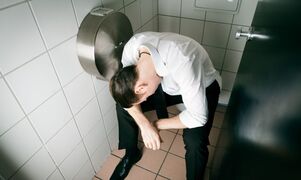Prostatitis is one of the most common urological diseases, in which an inflammatory process develops, involving the tissues of the prostate gland. Prostatitis can occur in men of all ages and is often accompanied by other diseases of the reproductive system. The causes of prostatitis in men can be different and to reduce the likelihood of developing this disease, they should be considered in more detail.
Classification

Regarding the development of the pathological process, there are three main forms of prostatitis:
- Sharp.Symptoms appear suddenly and appear as bright as possible. Therefore, most men with an acute course of prostatitis go to the doctor in the first days of the open course of the process. A typical symptom of the disease is severe low back pain, which occurs against the background of a rise in body temperature to 39 degrees. The most common cause of prostatitis is an infectious focus that can develop in distant organs.
- Chronic.If acute prostatitis is not treated in time, the disease becomes chronic. It is characterized by less pronounced symptoms and the general condition of the patient can be called satisfactory. The temperature drops to normal.
- Stagnation.Non-infectious inflammatory process. It is caused by stagnant processes observed in the pelvic organs. The disease is characterized by progressive development with a gradual increase in pathological symptoms. Today, this form of the disease is extremely rare.
The chronic form of the disease is considered very dangerous, as most men ignore mild symptoms by postponing a visit to a specialist. With this approach, the development of many complications of the disease is possible.
The disease is "younger" over time, so it can occur at any age.
What causes prostatitis?
This disease develops in one third of men aged 20-60 years. Therefore, unlike a number of diseases of the genitourinary system, this disease can not be called age-related. There are a number of causes of prostatitis in men, the main ones of which will be discussed below.
Acute and chronic infections
Infectious lesions are the leading cause of prostatitis. When the infection enters the prostate, an inflammatory process develops. Most often, diseases such as gonorrhea and urethritis become provokers of these forms of prostatitis.
Pathological processes such as caries, tonsillitis, tuberculosis and so on can provoke the development of infectious prostatitis.
In order to cure this form of the disease, it is necessary to eliminate the infectious agent that has become the main cause of its development. Only after neutralizing the main cause of the infection can prostatitis be completely cured.
Stagnation

Every man should have enough sex in his life - otherwise he will not avoid prostate problems.
The consequence of not having a regular sex life can be the development of prostate congestion. At the same time, the blood circulation in the organ is disturbed, as a result of which the secretion stagnates, which disrupts its functioning. All this can lead to deformation of the prostate and the development of an inflammatory process.
Regular sexual activity allows you to avoid stagnation of prostate secretions. In addition, experts recommend that their patients refrain from indiscriminate relationships by finding a permanent sexual partner.
Sedentary
In recent decades, there has been a sharp trend towards a transition from manual to mental labor. And it is a sedentary lifestyle that is one of the main causes of prostatitis in men.
In addition, a sedentary lifestyle leads to deterioration of the functions of the nervous, endocrine and cardiovascular systems. As a result, prostate cells receive less oxygen, which leads to the creation of optimal conditions for the reproduction of pathogenic microflora.
And while sedentary work is not a direct cause of prostatitis, it creates optimal conditions for prostate infection. Therefore, to prevent prostatitis, the body must provide regular physical activity.
When leading an active lifestyle, a person's blood flow is normalized, the endocrine and nervous systems work better. Therefore, the tissues of the prostate gland are protected from oxygen deprivation.
Prolonged abstinence
In the absence of regular sexual activity, the secretion stagnates in the body. In view of this, the blood circulation in the tissues of the prostate becomes difficult. The result is the same as leading a passive lifestyle.
Oxygen starvation leads to the fact that in the tissues of the prostate gland there are ideal conditions for the reproduction of pathogenic microflora. As a result, only a mild infection of the body will be enough to ensure the guaranteed development of prostatitis.
Hypothermia

Freezing is a sure way for pathology to occur.
Scientists claim that hypothermia is one of the main provokers of the development of prostatitis. Prostatitis from hypothermia develops for several reasons:
- Due to hypothermia, vasoconstriction occurs, which leads to a weakening of tissue nutrition and deterioration of organ function.
- With a significant freezing of the body, a person's immune system is weakened. This leads to the fact that the body becomes susceptible to various types of infectious lesions.
Hypothermia becomes especially dangerous for those men who have already developed prostatitis before. Even if the disease has been treated, it can recur.
To avoid the development of prostatitis, it is necessary to dress warmly during the cold season so as not to sit on cold and cold surfaces. It is also forbidden to walk barefoot on an insufficiently warm floor.
Other reasons
The development of prostatitis can occur not only for the above reasons, but also under the influence of such factors:
- obesity;
- poor working conditions in which there is a strong load on the perineal area or significant shaking;
- hormonal disorders;
- ARVI transferred to the legs;
- Chronic constipation.
The best prevention of this disease is to avoid the above factors. Men who have previously had prostatitis are particularly susceptible to developing the disease.
Who is at risk
Anyone who has had prostate problems before may have the disease again.
After looking at what causes prostatitis, it is necessary to determine the group of people predisposed to its occurrence. The following men are susceptible to prostatitis:

- leading a sedentary lifestyle;
- suffering from frequent constipation;
- obesity;
- engaged in sedentary work;
- under severe stress and hard physical labor;
- irregular sex or frequently changing sexual partners;
- previously had prostatitis;
- suffering from immune disorders;
- alcohol and cigarette abusers.
Characteristics of development in young and old age
Prostatitis can develop in young people due to a number of factors. The main ones are: sedentary work, lack of a full intimate life, sedentary lifestyle. To minimize the development of this disease, you need to eliminate these factors from your life.
In the elderly, the disease most often develops against the background of the disappearance of sexual function. As the body ages, the reproductive system undergoes changes, as a result of which sooner or later it ceases to function. A noticeable decrease in fertility is observed in men aged 45-50 years.
In addition, this can happen under the influence of hormonal changes in the body, due to which the volume of testosterone production decreases. These changes are one of the main causes of prostatitis.
Reasons for the transition from the acute stage of the disease to the chronic
While acute prostatitis is characterized by vivid symptoms that force the patient to seek professional help, the chronic form usually has no characteristic symptoms. In most cases, men are in no hurry to see a doctor, noticing a slight discomfort. And as a result, the disease develops in more severe forms.But how does the disease become chronic? The most common reason for the development of a chronic process is insufficiently treated acute form of the disease. In this case, the transition from one form to another takes place under the influence of the following factors:
- Treatment started late.
- Ineffective therapy performed or wrong technique chosen.
- The patient's immune response is significantly reduced. There is no cure for acute prostatitis.
It should be understood that the asymptomatic chronic course of the inflammatory process sooner or later ends in exacerbation. Then the patient has all the signs of the disease, including severe pain in the perineum and lower back, difficulty urinating and depression of sexual function.
Chronic prostatitis has one important feature: when primary inflammation of the prostate occurs, there is a deterioration of the innervation of this organ. This in turn has an extremely negative effect on its work, often causing autoimmune processes. In this case, the immune system begins to produce antibodies against the prostate tissue. Therefore, even if it eliminates the primary infection, it will not be possible to avoid the progression of such prostatitis.
Symptoms

The main symptom of prostatitis is pain. This indicates that an inflammatory process is developing in the prostate. In this case, the unpleasant sensations can be of different nature and intensity. Urination causes severe pain.
This disease is particularly inconvenient as it is in the acute stage of its development. Against the background of severe pain, the patient has sleep disorders, its performance is significantly reduced, just like the overall quality of life.
The pain of prostatitis is as follows:
- localized in the perineum, lower abdomen, lower back;
- radiate to the genital area;
- unpleasant sensations intensify when visiting the toilet, during arousal and in the process of ejaculation;
- are accompanied by sexual dysfunction.
Erection problems are a common symptom of a chronic form of the disease. Due to the fact that such dysfunctions may have different degrees of manifestation, then their therapy has some differences.
It is not uncommon for men to have a slow erection with prostatitis. Most patients cannot complete sexual intercourse at all or ejaculation is premature. Such disorders negatively affect the composition of sperm.
Methods of treatment
The specific type of therapy is determined by a specialist based on the characteristics of the course of the disease. In this case, the reasons why this disease develops must be taken into account. Thus, the main method of treating the acute form of the disease is antibiotic therapy. These drugs are taken even if the disease is not bacterial in nature.
Chronic prostatitis provides comprehensive treatment. It includes the following procedures:
- drug therapy;
- physiotherapy;
- taking immunomodulators;
- prostate massage.
If chronic prostatitis is non-bacterial in nature, it is treated with non-steroidal drugs. Sedatives are used as an adjunct treatment.
Prophylaxis of prostatitis is reduced to an active lifestyle, regular sexual intercourse with a regular partner and timely treatment of infectious diseases.
























